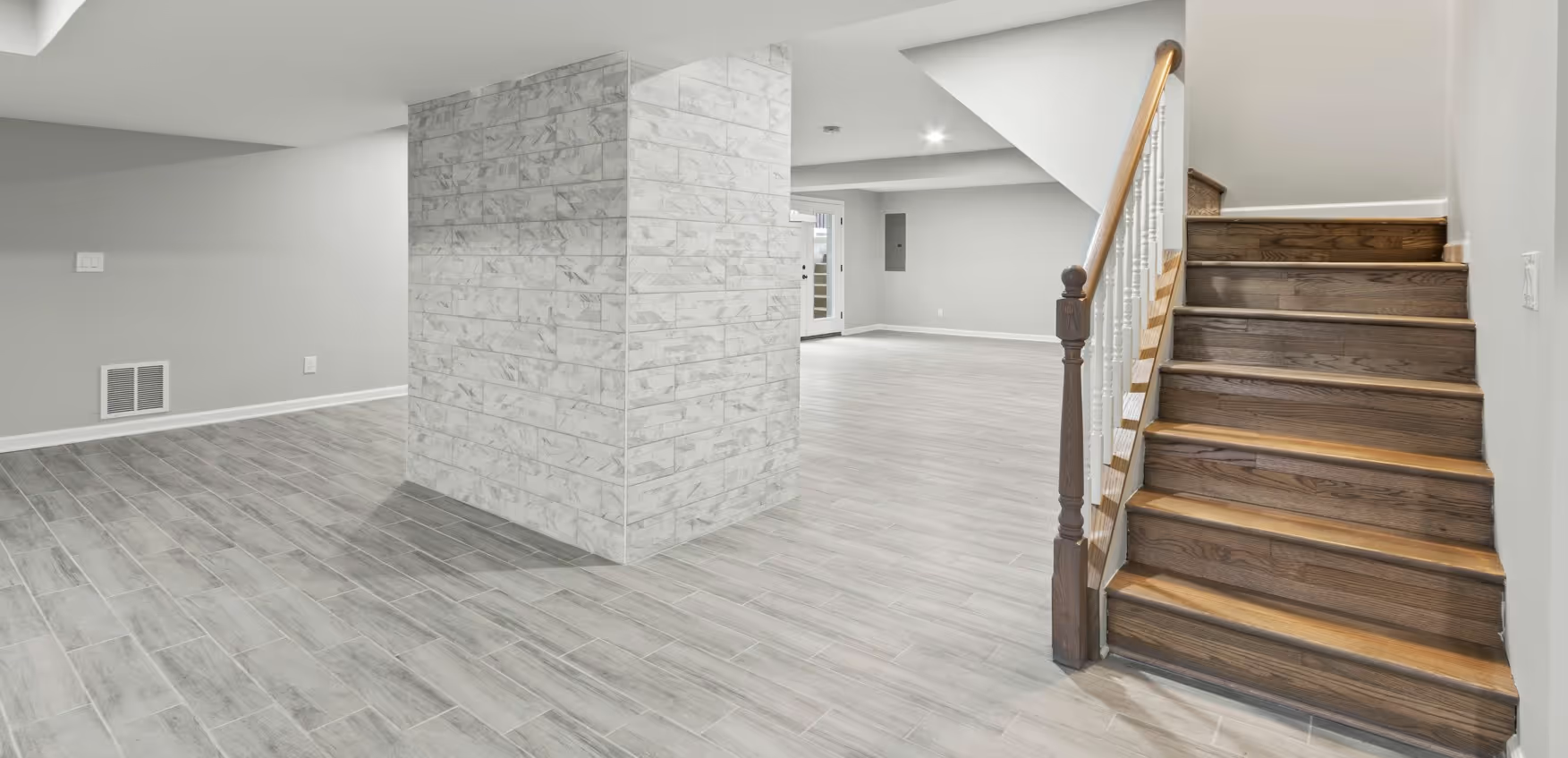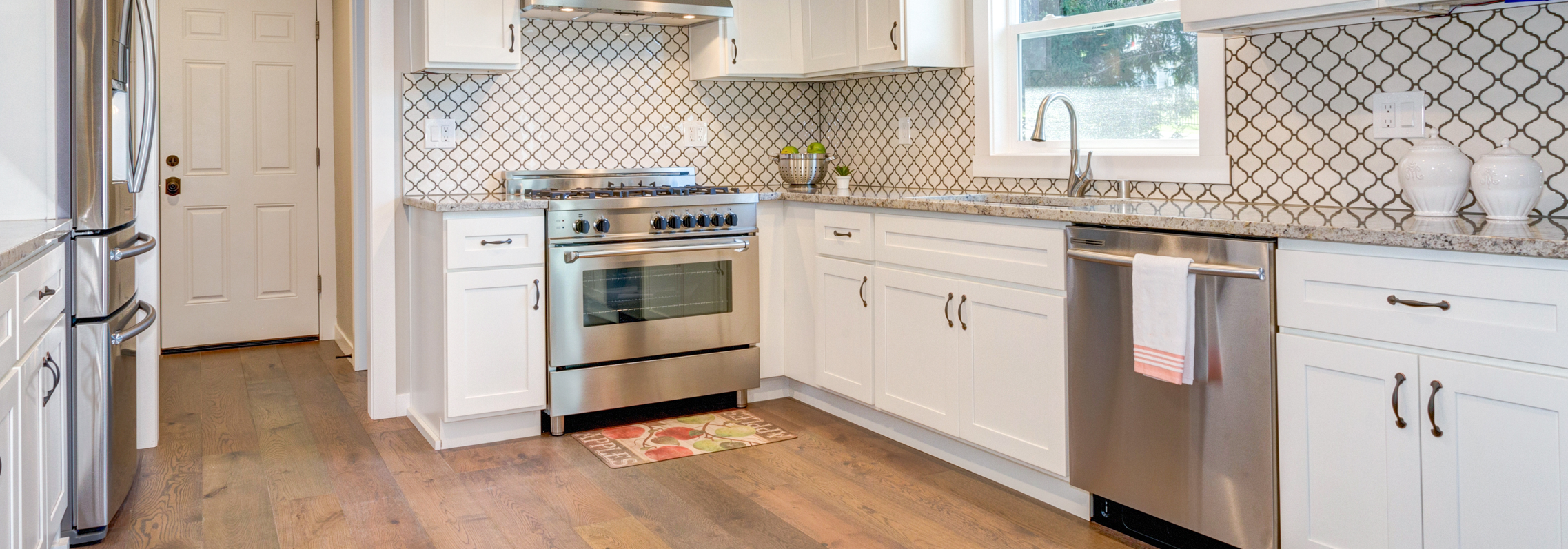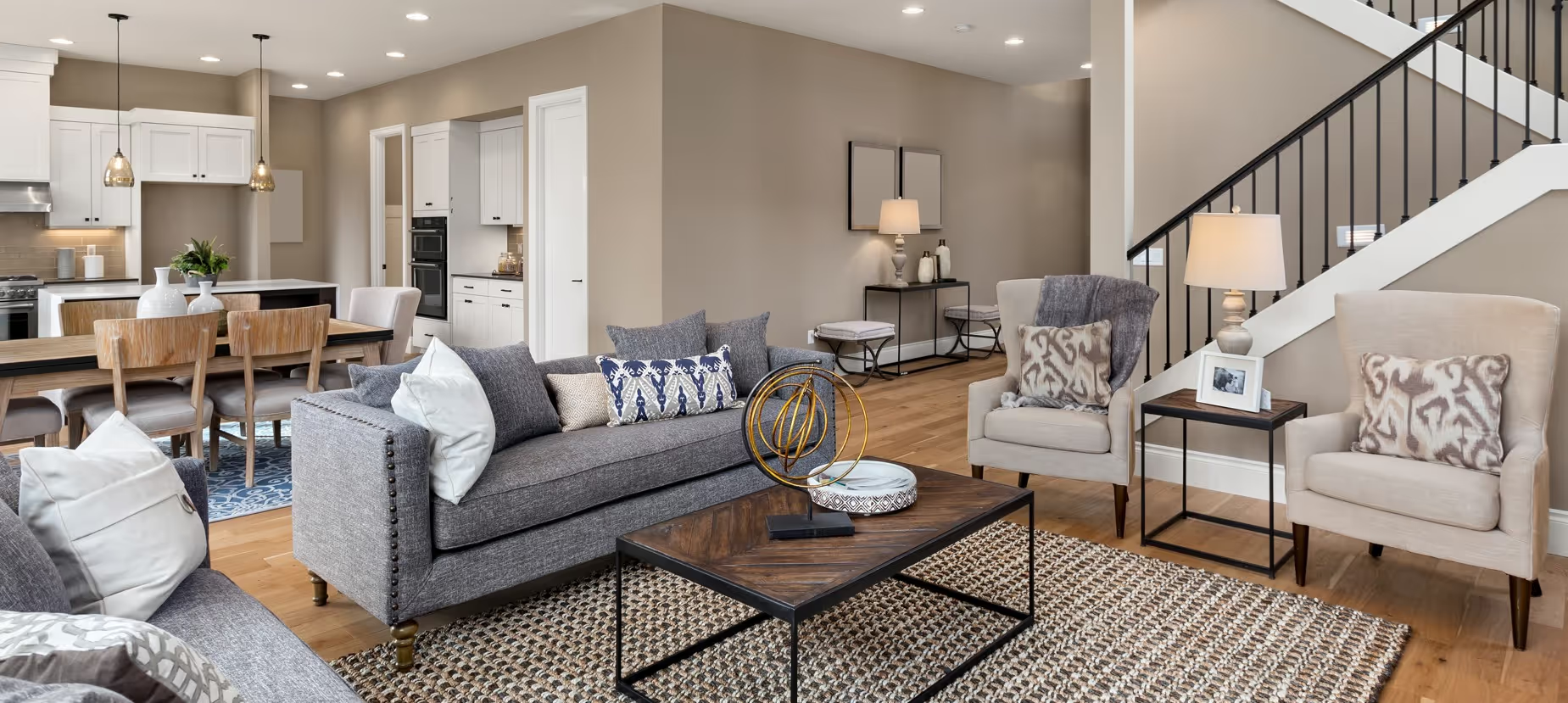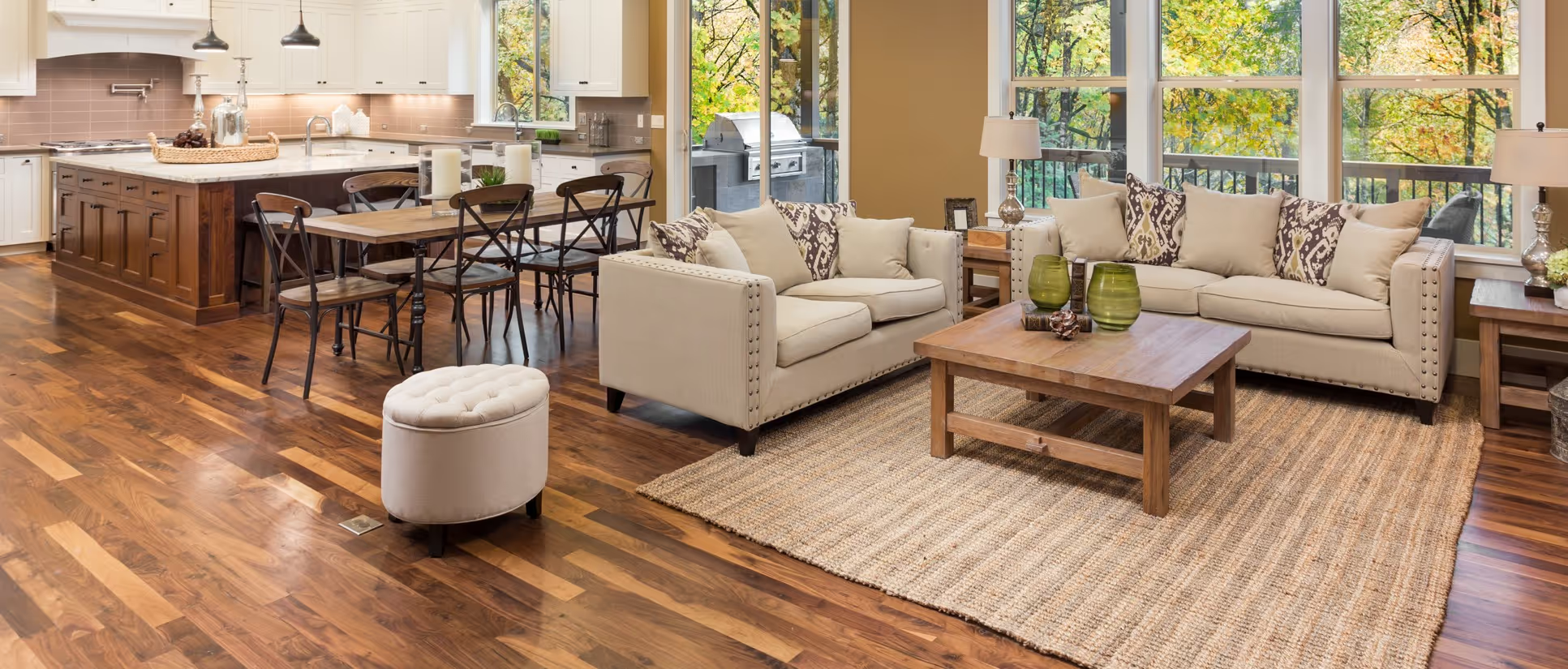
Richmond basements fight two relentless enemies every single day. Humidity and water. Sometimes it's the thick summer air that never seems to dry out. Other times it's groundwater seeping up through the foundation or the James River reminding us why the city built that flood wall back in the 1990s.
If you own a home in Richmond, you probably already know this struggle. Your basement might feel damp even when it hasn't rained in weeks. Or maybe you've dealt with actual flooding during heavy storms. Perhaps you've opened the basement door and caught that unmistakable musty smell that means moisture is winning the battle.
The worst part? Choose the wrong flooring for your Richmond basement, and you're looking at mold growth, ruined materials, and having to rip everything out to start over. Mold remediation alone becomes a massive project once it gets established. Nobody wants to deal with that.
But here's the good news. The right flooring can handle everything Richmond's climate throws at it. You can have a beautiful, finished basement that stays dry and looks great for years, even with our humidity and occasional water issues.
Let me show you exactly what works and what doesn't, based on 30 years of installing basement floors throughout the Richmond metro area.
Why Richmond Basements Need Special Flooring
Richmond isn't like other cities when it comes to basements. Our specific climate and geography create unique challenges that you need to understand before choosing any flooring.
First, there's Virginia's notorious humidity. We're talking 70% to 80% humidity during summer months, and it stays high well into fall. Basements naturally tend to be more humid than upper floors because they're underground where it's cooler. Cool air holds moisture, which is why your basement feels clammy even on days when the upstairs is comfortable.
Then you have our clay soil. That famous red Virginia clay that sticks to everything? It doesn't drain water well at all. When it rains, water sits on top of the clay instead of soaking in. That water has to go somewhere, and it often tries to find its way into your basement through cracks, seams, or just general seepage through concrete.
The James River adds another layer of complexity. Areas near the river or in low lying zones deal with higher groundwater tables. When the river floods, which happens periodically with heavy rain or tropical systems like Hurricane Helene, basements in certain neighborhoods can take on water. The 1972 Hurricane Agnes flood devastated Shockoe Bottom and other low areas. While the flood wall protects downtown now, basements throughout Richmond still face moisture challenges.
Historic Richmond homes create their own issues. Beautiful old houses in Church Hill, the Fan District, and the Museum District often have foundations built 80 to 100 years ago or more. These older foundations weren't built with modern waterproofing methods. Mortar joints deteriorate over time. Settling creates cracks. What started as a bone dry basement decades ago might now have moisture problems that need addressing.
Even newer construction in places like Short Pump or Midlothian isn't automatically safe from basement moisture. Poor grading around the foundation, inadequate drainage systems, or simple settling can all lead to water finding its way in.
The stakes are high if you get your flooring choice wrong. Mold loves basements because they provide everything mold needs to thrive. Dark spaces, organic materials to feed on, and most importantly, moisture. Once mold establishes itself in basement flooring or subfloors, removing it becomes a major project. You're not just replacing floors at that point. You're dealing with remediation, potential health issues, and making sure the mold doesn't come back.
Top Waterproof Basement Flooring Options for Richmond
Now let's talk about what actually works in Richmond basements. These options have proven themselves in hundreds of local homes dealing with our specific climate challenges.
Luxury Vinyl Plank with Waterproof Core (Our Top Pick)
If you want one flooring type that handles Richmond basements better than anything else, this is it. Luxury vinyl plank with a waterproof core checks every single box for basement use.
The construction is completely waterproof from top to bottom. Not water resistant. Waterproof. The core is made from materials that water cannot penetrate. This means if your basement takes on water during a storm, if a pipe leaks, or if groundwater seeps up, your floors don't get damaged. Once the water is gone and everything dries out, the flooring is fine.
This matters tremendously in Richmond where basements can go from dry to damp based on weather and season. Summer humidity that would make other materials swell and warp doesn't affect quality luxury vinyl at all. It stays stable no matter what the moisture level is doing.
Installation is another huge advantage. Most luxury vinyl plank uses a floating floor system with click together planks. You don't glue it down to the concrete, which means moisture coming up from below goes under the floor rather than getting trapped in adhesive. The floor can move slightly with temperature changes without any problems.
If water does get under the floor during flooding, you can pull up sections, dry everything out, and reinstall the same planks. Try doing that with glued down flooring or carpet. It's not happening.
The appearance is another win. Modern luxury vinyl plank looks incredibly realistic. You can get wood grain patterns that look like real hardwood, tile patterns, or even stone looks. Walking into a finished basement with quality luxury vinyl, most people assume they're looking at real wood floors. The visual difference is minimal, but the performance difference is massive.
Comfort underfoot is surprisingly good too. Unlike tile that's cold and hard, luxury vinyl has a bit of give to it. It's warmer to walk on barefoot and more forgiving if you drop something. For finished basements that get regular use as family rooms, playrooms, or home offices, this comfort factor matters.
This flooring works perfectly for finished basements throughout Richmond. Whether you're in a newer home in Glen Allen or a renovated historic house in Church Hill, luxury vinyl plank handles the moisture challenges while looking great.
Ceramic and Porcelain Tile
Tile is the ultimate durable option for basement floors. It's essentially waterproof and will last longer than you'll own your house.
Water simply cannot hurt tile. Not moisture from humidity, not standing water from flooding, not spills or leaks. The tile itself is fired clay or porcelain, which is inherently waterproof. As long as it's installed correctly with proper grout and sealant, tile floors in basements are bulletproof.
This makes tile perfect for Richmond basement areas that might see water. Laundry rooms are ideal candidates because washing machines can leak or overflow. Bathroom areas in finished basements benefit from tile's waterproof nature. Wet bars or kitchenette spaces where spills happen work great with tile.
Cleanup is incredibly easy. Mop it and you're done. No worrying about moisture soaking in or stains setting. For basements that might get dirty from outdoor access or storage, tile keeps looking good with minimal maintenance.
During Richmond's hot, humid summers, tile stays naturally cool. This can actually be pleasant in a basement where you want the space to feel refreshing. Some people specifically choose tile for basement floors because of this cooling effect.
The downsides are that tile is hard and can feel cold during winter months. If you're creating a cozy family room or bedroom space in your basement, tile might not give you the warm, comfortable feel you want. You can add area rugs for warmth and comfort, but then you're covering up your beautiful tile floor.
Installation requires more skill and time than luxury vinyl. Tile needs to be set properly with thin-set mortar on a level surface. Grout lines need to be sealed to prevent moisture from getting underneath. This usually means hiring professionals rather than doing it yourself.
But for the right applications in Richmond basements, especially utility areas and wet spaces, tile is unbeatable for durability and water resistance.
Engineered Vinyl Flooring
Engineered vinyl gives you good moisture resistance while offering versatility in both appearance and installation.
The construction includes multiple layers with a moisture resistant core. While not quite as bombproof as the waterproof luxury vinyl options, quality engineered vinyl handles normal basement humidity and minor moisture without issues. For Richmond basements that don't have serious water problems, this performs very well.
Installation goes quickly, often faster than tile and sometimes faster than luxury vinyl plank depending on the specific product. Many engineered vinyl products use simple click lock systems that make installation straightforward. For homeowners wanting to finish their basement on a timeline, this speed matters.
The appearance is good, with plenty of styles that mimic wood, stone, or tile. You get a finished look that elevates your basement space. For basement renovations where you're trying to create livable square footage, engineered vinyl delivers solid performance.
The key is choosing quality products designed specifically for basement use. Look for engineered vinyl with good warranty coverage and thick wear layers. Lower quality engineered vinyl won't hold up to moisture as well and will show wear faster in high traffic basement areas.
This option works well for finished basements throughout Richmond, especially in homes where the basement doesn't have active water problems but you still want protection against humidity and potential moisture.
What You Should Never Install in Richmond Basements
Knowing what to avoid is just as important as knowing what works. These materials fail in Richmond's humid basement conditions, and installing them is asking for problems.
Solid hardwood is the worst choice possible for basements. Real wood absorbs moisture like a sponge. In a humid Richmond basement, solid hardwood will cup, warp, and buckle. Even if your basement seems dry now, seasonal humidity changes will cause the wood to expand and contract. Over time, this creates permanent damage. Plus if you ever do get water in the basement, solid hardwood is completely ruined. There's no saving it.
Regular carpet comes in second place for terrible basement flooring choices. Carpet and padding trap moisture and create perfect environments for mold growth. That basement smell everyone recognizes? That's often mold growing in carpet padding. Even if the surface dries out, moisture stays trapped underneath where you can't see it. Cleaning carpet in basements is also difficult, and odors from moisture or mildew never fully come out. Just don't do carpet in Richmond basements unless you enjoy mold problems.
Cork flooring without proper sealing will absorb moisture and swell. Cork is a natural material that's porous, which makes it vulnerable in humid environments. Some cork products are sealed well enough for basement use, but most aren't, and the risk is high. Better to choose something designed specifically for moisture prone areas.
Any flooring installed without a proper moisture barrier is a mistake in Richmond basements. Even with waterproof flooring, you want vapor barriers between the concrete and the floor to manage moisture coming up from below. Skipping this step to save time creates problems down the road.
Laminate flooring that isn't specifically rated as water resistant will fail in basements. Standard laminate has a wood fiber core that swells when it gets wet. Once swelling happens, the floor is permanently damaged. If you want the look of laminate, make sure you're actually getting water resistant luxury vinyl plank instead.
Dealing with Richmond's Unique Moisture Challenges
Understanding moisture barriers and moisture control is critical for Richmond basement floors to perform well long term.
Vapor barriers are simple in concept but important in practice. They're essentially thick plastic sheeting that goes between your concrete basement floor and whatever flooring you install on top. The barrier stops moisture vapor from concrete from reaching your flooring. Without this barrier, moisture comes up through the concrete (concrete is porous and lets water vapor through) and gets trapped under your floor. This creates perfect conditions for mold and can damage even water resistant flooring over time.
Installing vapor barriers correctly matters. The plastic needs to overlap at seams and be sealed with tape. It should run up the walls a few inches so moisture can't get around the edges. Any penetrations for pipes or posts need to be sealed carefully. A poorly installed vapor barrier doesn't do much good.
Dehumidifiers are your friend in Richmond basements. Even with perfect flooring and good vapor barriers, controlling humidity levels makes everything work better. A basement dehumidifier keeps moisture levels down during our humid months, which protects your floors and prevents that musty basement smell from developing. For finished basements that you actually use and enjoy, a dehumidifier is essential.
Testing your basement for moisture before installing any flooring is smart. Simple tests exist where you tape plastic squares to the concrete floor and check them after 24 hours. If moisture appears under the plastic, you have vapor transmission from below that needs addressing. Professional moisture testing gives you specific readings and can identify problem areas.
Historic homes in neighborhoods like Church Hill often face bigger moisture challenges than newer construction. Old foundations have cracks and gaps that let water in. Mortar joints between stones deteriorate over 80 or 100 years. These older basements might need foundation repairs or waterproofing work before any flooring goes down. Ignoring foundation issues and just installing floors on top is throwing money away.
Newer homes in the West End or Henrico typically have better foundation waterproofing, but they're not immune to problems. Settling during the first few years can create small cracks. Landscaping that directs water toward the foundation creates moisture problems. Even new construction needs proper drainage around the exterior to keep basements dry.
French drains and sump pumps are common solutions for Richmond basements with water problems. French drains collect water around the foundation perimeter and direct it away from the house. Sump pumps actively remove water that gets into the basement. If your basement has had standing water or significant moisture issues, these systems might be necessary before you can successfully install any flooring.
Installation Tips for Richmond's Humid Climate
Proper installation makes a huge difference in how well your basement flooring performs in Richmond's climate.
Material acclimation is critical. Let your flooring materials sit in the basement where they'll be installed for at least 48 to 72 hours before installation. This gives them time to adjust to the temperature and humidity levels. Skipping this step can lead to floors that expand or contract after installation, creating gaps or buckling.
During acclimation, keep your HVAC running at normal settings. Don't try to acclimate materials in an unheated or uncooled basement. The materials need to adjust to the actual conditions they'll live in once installed.
Subfloor preparation cannot be skipped. Your concrete basement floor needs to be clean, dry, and relatively level before any flooring goes down. Sweep and vacuum thoroughly to remove all dust and debris. Check for cracks that might need patching. Use a level to identify high and low spots that could cause problems.
If the concrete is very uneven, you might need self leveling compound to create a flat surface. This is especially common in older Richmond homes where floors have settled over decades. Trying to install flooring over an uneven surface leads to problems no matter what type you're using.
Check carefully for existing water damage or mold before installation. Look at baseboards, wall bases, and any existing flooring for signs of water staining or mold growth. If you find problems, address them before new flooring goes down. Installing beautiful new floors over hidden mold just covers up a problem that will get worse.
Know when to call professionals versus attempting DIY installation. Luxury vinyl plank is DIY friendly for people with basic skills and the right tools. Many homeowners successfully install it themselves. Tile work, on the other hand, requires specialized skills and tools that most DIYers don't have. Poor tile installation in a basement can lead to water getting underneath and causing damage.
For basements with moisture challenges, professional installation makes sense even for materials that could be DIY. Professionals know how to properly install vapor barriers, handle moisture issues, and ensure everything is done correctly the first time. The cost of professional installation is less than the cost of doing it wrong and having to redo everything.
Real Examples from Richmond Homeowners
Let me share some actual situations we've dealt with in Richmond basements to show you how these flooring choices play out in real life.
A family in the Museum District wanted to finish their basement to create a playroom and home office. Their basement wasn't actively wet, but it definitely felt humid in summer. They originally considered laminate flooring to save money. We convinced them to go with luxury vinyl plank instead, explaining how Richmond's humidity would eventually damage regular laminate. Three years later, the basement looks perfect. Summer humidity comes and goes, but the floors stay completely stable. Their kids use the space constantly, and the flooring shows minimal wear.
A homeowner in Lakeside dealt with periodic flooding in their basement during heavy rain. Water would come in through foundation cracks maybe once a year during severe storms. They wanted to finish the basement but were nervous about flooring that might get damaged. We installed luxury vinyl plank with a proper vapor barrier underneath. The next time heavy rain came through and water got in the basement, they were able to remove the water, let everything dry out, and the floors were completely fine. No damage at all. That wouldn't have been possible with almost any other flooring type.
Someone in Short Pump converted their basement into a home gym and workshop area. They wanted flooring that could handle heavy equipment, potential spills, and the general abuse of a workshop. We put in porcelain tile throughout. The tile handles weight from gym equipment without any issues. Spills from paint or other projects wipe right up. The floor stays cool during summer workouts. After several years of hard use, the tile still looks nearly new.
A Church Hill homeowner with a historic 1920s house had a damp basement with an old stone foundation. They wanted to create a family room down there but knew moisture was an issue. We had to address foundation waterproofing first, then install a proper vapor barrier system. Once the moisture situation was under control, we installed luxury vinyl plank. The key was handling the underlying problems before installing any flooring. Now they have a beautiful finished space that stays dry and comfortable year round.
A couple in Henrico had installed regular carpet in their finished basement years ago. Over time, the basement started smelling musty. When we pulled up the carpet, we found mold growing in the padding underneath. The basement had never flooded, but normal humidity and occasional dampness had been enough to create mold in the carpet system. We remediated the mold, installed a proper vapor barrier, and put down waterproof luxury vinyl. The musty smell disappeared completely, and the basement is now a healthy, usable space again.
Working with Quality Materials and Expert Installation
At James River Flooring, we've built relationships with all the major flooring manufacturers. This gives us access to the best products available for Richmond's challenging basement conditions.
Not all waterproof vinyl is created equal. There are significant quality differences between products that look similar in a showroom. We know which manufacturers make products with thick wear layers, robust cores, and reliable waterproofing. We also know which products have proven themselves in real Richmond basements over years of use.
The same goes for tile. Quality porcelain tile performs very differently than cheap ceramic tile. We can guide you toward products that will hold up long term and away from products that might crack or show wear quickly.
Our experience with Richmond's specific climate conditions matters. We understand how humidity affects different flooring materials. We know what works in historic homes versus new construction. We can look at your specific basement situation and recommend solutions that will actually work, not just flooring that looks good in a showroom.
Professional installation brings all of this together. Even the best flooring materials won't perform properly if they're not installed correctly. Our installers understand moisture barriers, proper acclimation, subfloor preparation, and all the other details that make the difference between a basement floor that lasts decades and one that fails in a few years.
We also know when additional work is needed before flooring can be installed. If your basement has active moisture problems, foundation issues, or mold that needs remediation, we'll tell you honestly what needs to be addressed first. Installing floors over existing problems just wastes your money and creates bigger issues down the road.
Stop Worrying About Your Richmond Basement Floors
A finished basement should be an asset to your home, not a constant worry about moisture and mold. With the right flooring choice and proper installation, you can have a beautiful basement space that performs well for decades despite Richmond's challenging climate.
The key takeaways are simple. Choose truly waterproof flooring like luxury vinyl plank or tile. Skip materials that can't handle moisture like solid hardwood and regular carpet. Always use proper vapor barriers under your flooring. Control humidity with dehumidifiers. Address any foundation or moisture problems before installing floors.
Richmond's humidity and occasional water issues don't have to make basements off limits. They just mean you need to make smart choices about materials and installation. Luxury vinyl plank handles humidity without any problems. Tile is essentially indestructible against water. Both give you finished basements that look great and stay healthy.
Don't let fear of moisture keep you from finishing your basement. The right flooring solutions exist, and they work. From Church Hill to Chesterfield, Short Pump to the Museum District, Richmond homeowners are creating beautiful basement spaces that handle our climate challenges.
Whether you're dealing with a historic home with an old foundation or a newer house in the suburbs, the principles are the same. Control moisture at the source, use appropriate materials, install properly, and maintain humidity levels. Do these things right, and your basement becomes valuable living space instead of wasted square footage.
At James River Flooring, we've helped hundreds of Richmond homeowners transform their basements with flooring that actually works in our climate. We understand the challenges you're facing because we've dealt with them countless times. We know which products hold up and which ones fail. We know how to install floors so they perform well even when humidity climbs and occasional moisture appears.
Your basement doesn't have to smell musty or feel damp. You don't have to worry about mold growing under your floors. You don't have to treat your basement as unusable space. With the right approach, your basement becomes the extra family room, home office, playroom, or guest suite you've been wanting.
Great basement flooring for Richmond homes isn't about finding something that's merely okay. It's about choosing materials specifically designed to handle moisture, installed by people who understand local conditions, with proper moisture management from top to bottom. Do it right, and you'll enjoy your finished basement for years without moisture worries or flooring failures.
Similar Articles

Best Flooring for Kitchens in Richmond, VA

2025 Flooring Trends Richmond Metro Area Homeowners Are Loving

Luxury Vinyl vs. Hardwood Flooring: RVA Metro Area Homeowner's Guide
Get Started Today!
Ready to transform your space with beautiful new flooring? Contact us today for your free in-home consultation and estimate. Our expert team is here to answer your questions and help you find the perfect flooring solution for your home or business.
